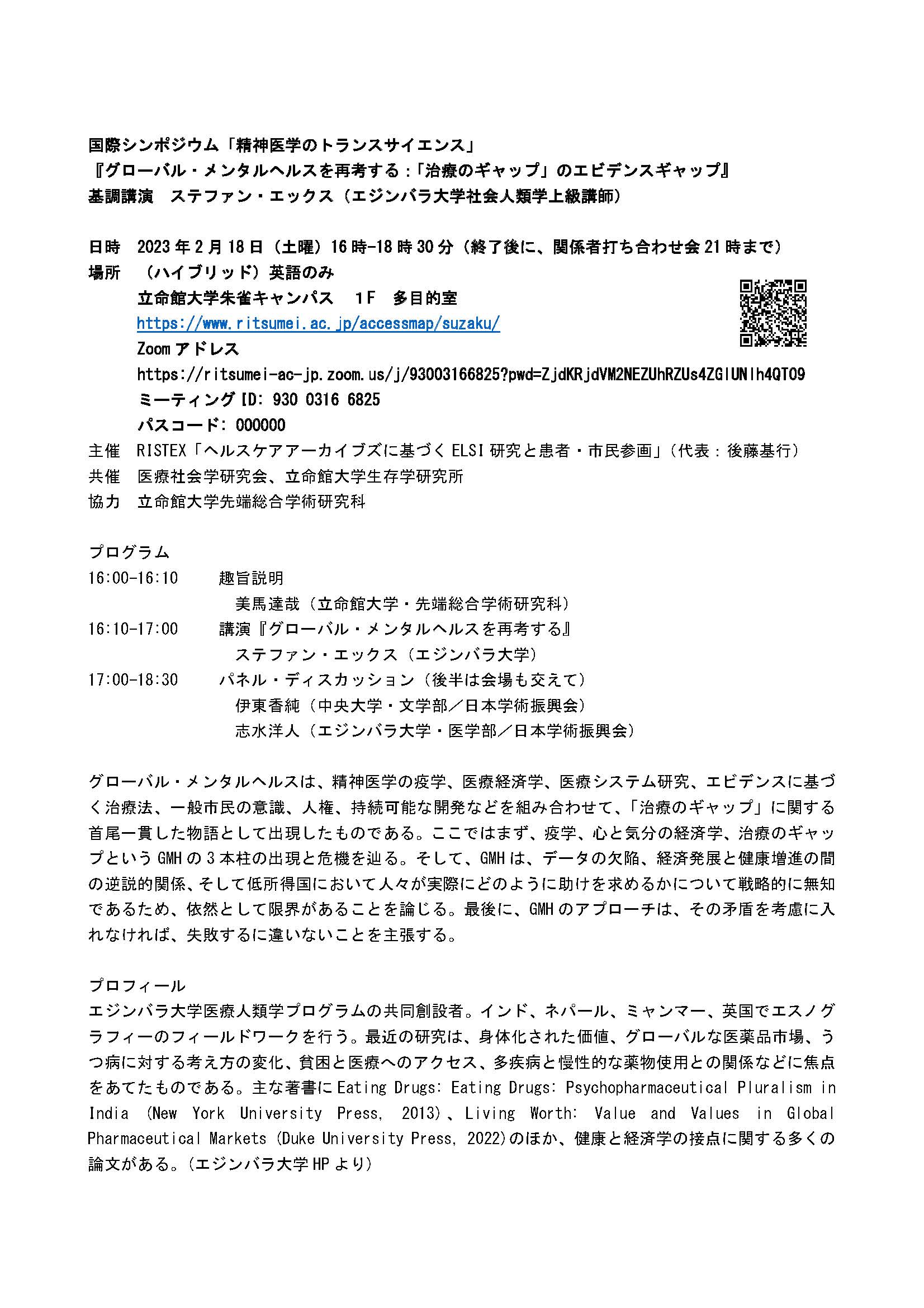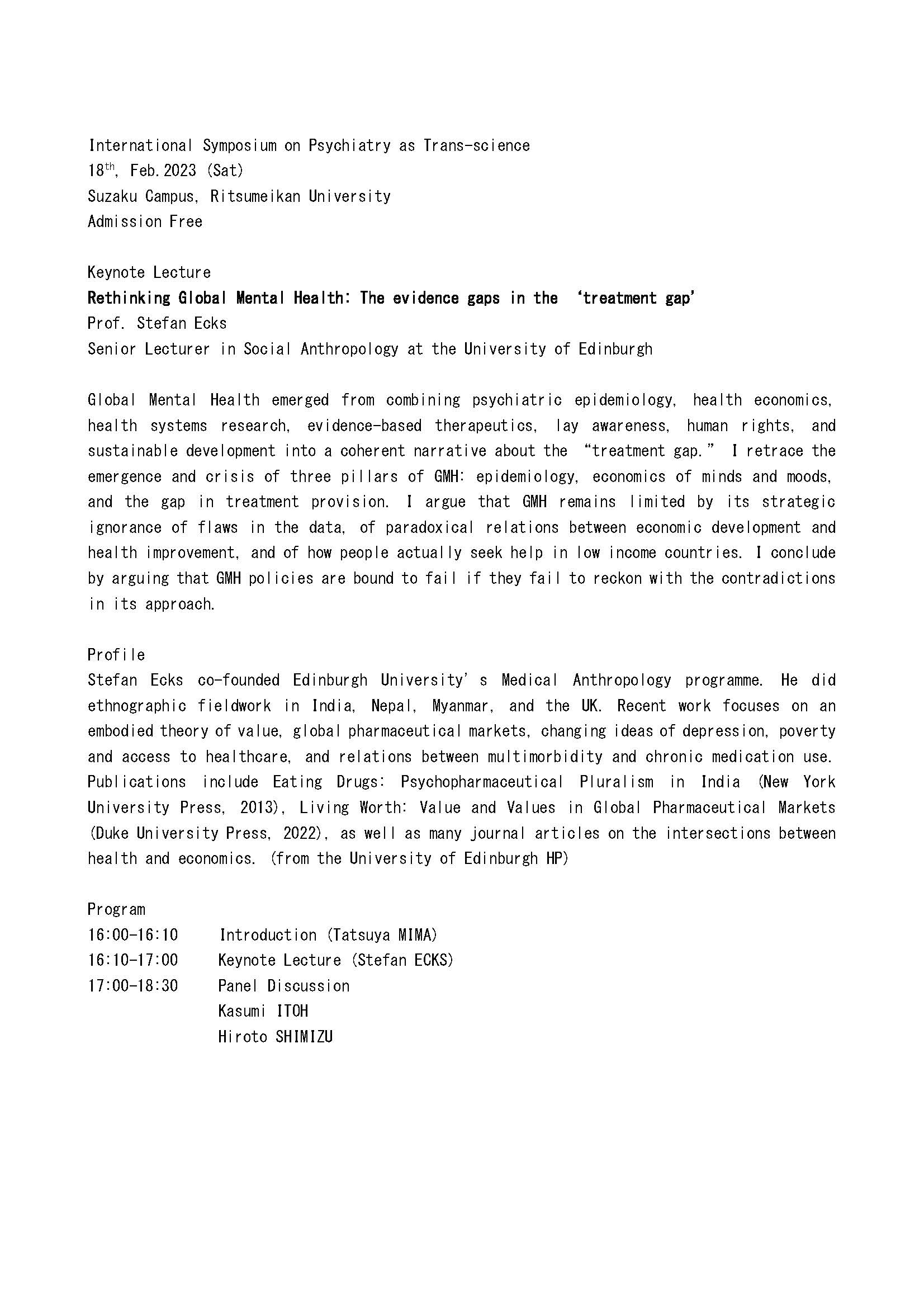国際シンポジウム「精神医学のトランスサイエンス」
国際シンポジウム「精神医学のトランスサイエンス」
『グローバル・メンタルヘルスを再考する:「治療のギャップ」のエビデンスギャップ』
基調講演 ステファン・エックス(エジンバラ大学社会人類学上級講師)
◇日時
2023年2月18日(土曜)16時-18時30分(終了後に、関係者打ち合わせ会21時まで)
◇場所
(ハイブリッド)英語のみ
立命館大学朱雀キャンパス 1F 多目的室
アクセス
Zoomアドレス
https://ritsumei-ac-jp.zoom.us/j/93003166825?pwd=ZjdKRjdVM2NEZUhRZUs4ZGlUNlh4QT09
ミーティングID: 930 0316 6825
パスコード: 000000
主催 RISTEX「ヘルスケアアーカイブズに基づくELSI研究と患者・市民参画」(代表:後藤基行)
共催 医療社会学研究会、立命館大学生存学研究所
協力 立命館大学先端総合学術研究科
◇プログラム
16:00-16:10 趣旨説明
美馬達哉(立命館大学・先端総合学術研究科)
16:10-17:00 講演『グローバル・メンタルヘルスを再考する』
ステファン・エックス(エジンバラ大学)
17:00-18:30 パネル・ディスカッション(後半は会場も交えて)
伊東香純(中央大学・文学部/日本学術振興会)
志水洋人(エジンバラ大学・医学部/日本学術振興会)
グローバル・メンタルヘルスは、精神医学の疫学、医療経済学、医療システム研究、エビデンスに基づく治療法、一般市民の意識、人権、持続可能な開発などを組み合わせて、「治療のギャップ」に関する首尾一貫した物語として出現したものである。ここではまず、疫学、心と気分の経済学、治療のギャップというGMHの3本柱の出現と危機を辿る。そして、GMHは、データの欠陥、経済発展と健康増進の間の逆説的関係、そして低所得国において人々が実際にどのように助けを求めるかについて戦略的に無知であるため、依然として限界があることを論じる。最後に、GMHのアプローチは、その矛盾を考慮に入れなければ、失敗するに違いないことを主張する。
◇プロフィール
エジンバラ大学医療人類学プログラムの共同創設者。インド、ネパール、ミャンマー、英国でエスノグラフィーのフィールドワークを行う。最近の研究は、身体化された価値、グローバルな医薬品市場、うつ病に対する考え方の変化、貧困と医療へのアクセス、多疾病と慢性的な薬物使用との関係などに焦点をあてたものである。主な著書にEating Drugs: Eating Drugs: Psychopharmaceutical Pluralism in India (New York University Press, 2013)、Living Worth: Value and Values in Global Pharmaceutical Markets (Duke University Press, 2022)のほか、健康と経済学の接点に関する多くの論文がある。(エジンバラ大学HPより)
Keynote Lecture
Rethinking Global Mental Health: The evidence gaps in the ‘treatment gap’
Prof. Stefan Ecks
Senior Lecturer in Social Anthropology at the University of Edinburgh
◇International Symposium on Psychiatry as Trans-science
18th, Feb.2023 (Sat)
Suzaku Campus, Ritsumeikan University
Admission Free
Global Mental Health emerged from combining psychiatric epidemiology, health economics, health systems research, evidence-based therapeutics, lay awareness, human rights, and sustainable development into a coherent narrative about the “treatment gap.” I retrace the emergence and crisis of three pillars of GMH: epidemiology, economics of minds and moods, and the gap in treatment provision. I argue that GMH remains limited by its strategic ignorance of flaws in the data, of paradoxical relations between economic development and health improvement, and of how people actually seek help in low income countries. I conclude by arguing that GMH policies are bound to fail if they fail to reckon with the contradictions in its approach.
◇Program
16:00-16:10 Introduction (Tatsuya MIMA)
16:10-17:00 Keynote Lecture (Stefan ECKS)
17:00-18:30 Panel Discussion
Kasumi ITOH
Hiroto SHIMIZU
◇Profile
Stefan Ecks co-founded Edinburgh University’s Medical Anthropology programme. He did ethnographic fieldwork in India, Nepal, Myanmar, and the UK. Recent work focuses on an embodied theory of value, global pharmaceutical markets, changing ideas of depression, poverty and access to healthcare, and relations between multimorbidity and chronic medication use. Publications include Eating Drugs: Psychopharmaceutical Pluralism in India (New York University Press, 2013), Living Worth: Value and Values in Global Pharmaceutical Markets (Duke University Press, 2022), as well as many journal articles on the intersections between health and economics. (from the University of Edinburgh HP)




